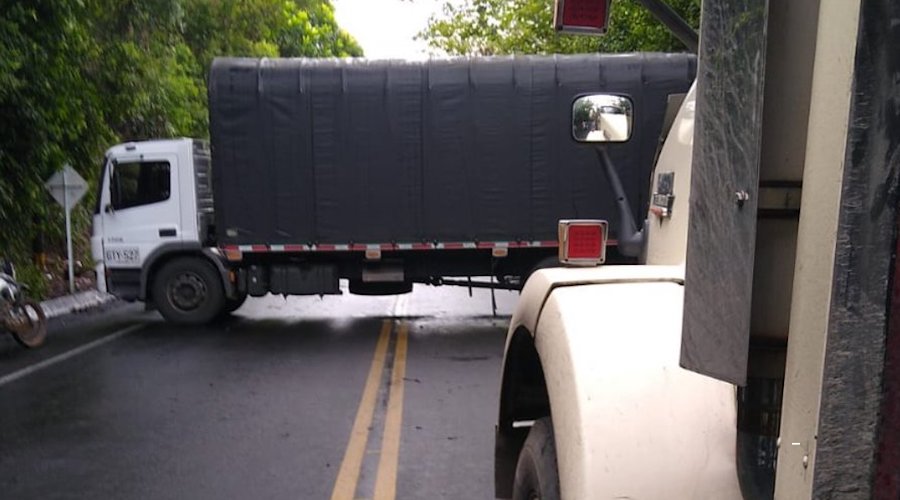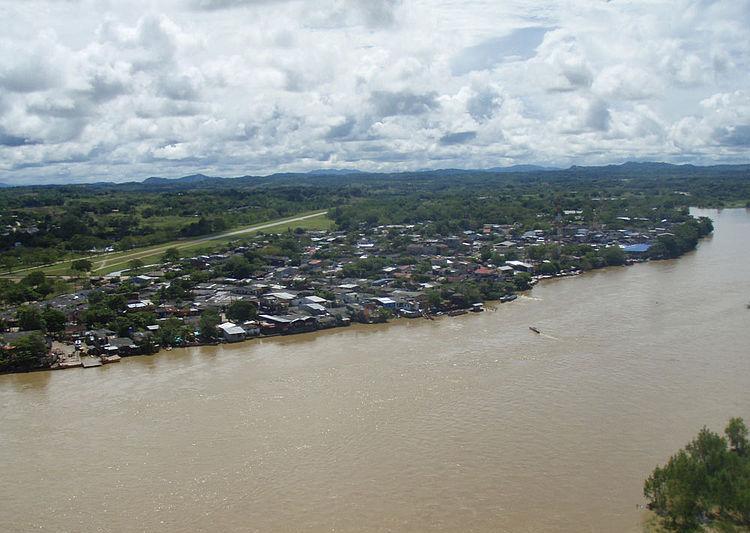Reuters | March 12, 2023

Blockade in Colombia’s Antioquia department. (Image by Antioquia’s Governor Aníbal Gaviria Correa, Twitter.)
Up to 300,000 people in Colombia are suffering shortages of food and medicine after informal and illegal gold miners blocked roads in protest of the destruction of their machinery by authorities, ministers said on Thursday.

Small, medium and large-scale gold miners in 12 largely rural municipalities across Antioquia and Cordoba provinces protested the destruction earlier this month of nine so-called “dragons” – floating machines that suck up silt and mud from rivers in search of alluvial gold.
The machines were causing “a highly sensitive disaster to the environment and endangering the lives of the inhabitants and future inhabitants in the area, as well as the environmental sustainability of the region,” Interior Minister Alfonso Prada said in a televised address.
Roadblocks caused by the protesting miners are affecting people’s lives across Antioquia and Cordoba, Prada said, adding that they were leading to shortages of food and medical supplies, such as oxygen tanks.
“As long as the roadblocks exist, the possibility of us returning to the table is nil,” Prada said, adding that the government had sought mediation from the Catholic Church to help reach an agreement.
Illegal mining in Colombia and other countries in South America is considered an environmental disaster due to the destruction it wreaks on numerous ecosystems, including mercury contamination in rivers.
“Currently, excavators in Bajo Cauca pump out almost 30 million cubic meters of earth and dump tonnes of mercury into the Cauca river,” Environment Minister Susana Muhamad said in the press conference.
After drug trafficking, illegal mining is considered the second biggest source of financing for illegal armed groups operating in Colombia, according to security sources.
The UN Office on Drugs and Crime (UNODC) said 65% of Colombia’s alluvial gold production in 2021 was illegal.
(By Oliver Griffin; Edited by Jamie Freed)
Mineros pauses Nechi Alluvial operations due to anti-gov’t protests in Colombia

Blockade in Colombia’s Antioquia department. (Image by Antioquia’s Governor Aníbal Gaviria Correa, Twitter.)
Up to 300,000 people in Colombia are suffering shortages of food and medicine after informal and illegal gold miners blocked roads in protest of the destruction of their machinery by authorities, ministers said on Thursday.

Small, medium and large-scale gold miners in 12 largely rural municipalities across Antioquia and Cordoba provinces protested the destruction earlier this month of nine so-called “dragons” – floating machines that suck up silt and mud from rivers in search of alluvial gold.
The machines were causing “a highly sensitive disaster to the environment and endangering the lives of the inhabitants and future inhabitants in the area, as well as the environmental sustainability of the region,” Interior Minister Alfonso Prada said in a televised address.
Roadblocks caused by the protesting miners are affecting people’s lives across Antioquia and Cordoba, Prada said, adding that they were leading to shortages of food and medical supplies, such as oxygen tanks.
“As long as the roadblocks exist, the possibility of us returning to the table is nil,” Prada said, adding that the government had sought mediation from the Catholic Church to help reach an agreement.
Illegal mining in Colombia and other countries in South America is considered an environmental disaster due to the destruction it wreaks on numerous ecosystems, including mercury contamination in rivers.
“Currently, excavators in Bajo Cauca pump out almost 30 million cubic meters of earth and dump tonnes of mercury into the Cauca river,” Environment Minister Susana Muhamad said in the press conference.
After drug trafficking, illegal mining is considered the second biggest source of financing for illegal armed groups operating in Colombia, according to security sources.
The UN Office on Drugs and Crime (UNODC) said 65% of Colombia’s alluvial gold production in 2021 was illegal.
(By Oliver Griffin; Edited by Jamie Freed)
Staff Writer | March 12, 2023 |

Nechí River is a river of northwestern Colombia. Credit: Wikipedia
Mineros SA (TSX: MSA) has temporarily suspended all operations at its Nechí Alluvial property due to ongoing protests by groups unassociated with the company against the Colombian government, which have caused disruptions throughout the Bajo Cauca region.

The Medellin-based gold miner said it will resume operations when it can ensure the safety and security of its employees and contractors, adding that an extended suspension of operations may “negatively impact” the company’s ability to meet its production guidance from the Nechí Alluvial project.
The Nechí Alluvial property is comprised of alluvial gold deposits found in the Nechí River lower basin that are predominantly mined through suction and bucket line dredging.
Dredging operations are carried out 24 hours a day, every day, at an extraction rate of 73,400 m³. Planned annual production from mid-2021 until the end of mine life in 2034 is 27 million m³, resulting in an average hourly production of more than 4,000 m³.
A 2021 technical report on Nechí Alluvial shows that the property hosts 376 million m³ in proven and probable mineral reserves at a grade of 109 milligrams per cubic metre, for 1.17 million ounces of contained gold.

Nechí River is a river of northwestern Colombia. Credit: Wikipedia
Mineros SA (TSX: MSA) has temporarily suspended all operations at its Nechí Alluvial property due to ongoing protests by groups unassociated with the company against the Colombian government, which have caused disruptions throughout the Bajo Cauca region.

The Medellin-based gold miner said it will resume operations when it can ensure the safety and security of its employees and contractors, adding that an extended suspension of operations may “negatively impact” the company’s ability to meet its production guidance from the Nechí Alluvial project.
The Nechí Alluvial property is comprised of alluvial gold deposits found in the Nechí River lower basin that are predominantly mined through suction and bucket line dredging.
Dredging operations are carried out 24 hours a day, every day, at an extraction rate of 73,400 m³. Planned annual production from mid-2021 until the end of mine life in 2034 is 27 million m³, resulting in an average hourly production of more than 4,000 m³.
A 2021 technical report on Nechí Alluvial shows that the property hosts 376 million m³ in proven and probable mineral reserves at a grade of 109 milligrams per cubic metre, for 1.17 million ounces of contained gold.
No comments:
Post a Comment